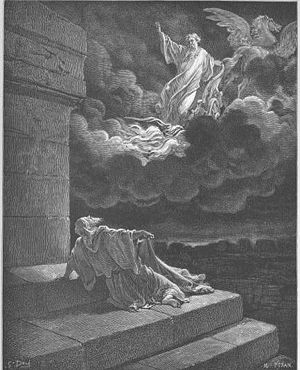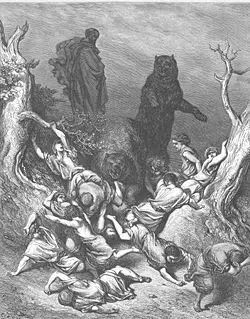Elisha
Elisha (Hebrew: אֱלִישַׁע, Standard Elišaʿ Tiberian ʾĔlîšaʿ ; "My God is salvation") is a Biblical prophet. In Latin, (and in English to some Catholics) he is known as Eliseus; however, the standard English form of the name has been "Elisha," at least since the introduction of the King James Version of the Bible. He is also a prophet in Islam under the name Al-Yasa.
Biblical biography
Background
Elisha's ministry takes place in the background of troubled times for the Yahwist prophets, for they faced persecution under the influence of Jezebel, queen of the northern Kingdom of Israel. The prophet Elijah was Jebebel's chief antagonist in this struggle and had been forced into exile in the south by Jezebel after conducting a slaughter of 450 the prohets of Baal at Mount Carmel.
Elisha was the son of Shaphat of a place called Abel Meholah. Unlike most prophets, Elisha was not called by God directly but was summoned from his farm work by the prophet Elijah. God prophecy concerning Elisha invovled was a dire one, involve political intrigue and bloodshed:
- Go to the Desert of Damascus. When you get there, anoint Hazael king over Aram (Syria). Also, anoint Jehu son of Nimshi king over Israel, and anoint Elisha son of Shaphat from Abel Meholah to succeed you as prophet. Jehu will put to death any who escape the sword of Hazael, and Elisha will put to death any who escape the sword of Jehu. (1 Kings 19:15-17)
On his way from Sinai to Damascus, Elijah found Elisha plowing a field with his oxen. Elisha responded immediate to Elijah's call, pausing long enough only to kiss his parents goodbye and slaughter his oxen. For the next seven or eight years Elisha became Elijah's close attendant until Elijah was taken up into heaven. The Bible is silent concerning Elisha's activities during this period, and the biblical chronology is difficult to follow since the stories of Elijah and Elisha apparently originate from a separate source and have interspersed into the narrative by a later editor.
In any case, by the time Elisha emergedin his own right, King Ahab had two important military victories against Israel's enemy, Ben-Hadad of Syria, with God's support as expressed through an unnamed prophet of God. However, Ahab also ran afoul of Elijah once again over the matter of Naboth's vineyard (see article on Ahab). Ahab repented before Elijah, and God grated him a reprieve. However, when Ahab joined forces with King Jehoshaphat of Judah and marcheed once more against the Syrians at Ramoth-Gilead he was mortally wounded. His son Joram now reiged in his stead. During this period, under the influence of the Phoenicia-born Jezebel, Baal worship was allowed to flourish alongside that of Israel's God, much to the disapproval of His prophets.
Early ministry
As Elijah's life drew near its end, Elisha went with his master from Gilgal to Bethel, to Jericho, and thence to the eastern side of the Jordan River. the waters of which, touched by the mantle, divided, so as to permit both to pass over on dry ground. Elisha then beheld Elijah in a fiery chariot taken up by a whirlwind into heaven.
By means of the mantle let fall from Elijah, Elisha miraculously recrossed the Jordan, and so won from the prophets at Jericho the recognition that "the spirit of Elias hath rested upon Eliseus" (2 Kings 2:1-15). He won the gratitude of the people of Jericho for healing with salt its barren ground and its waters. Elisha also knew how to strike with salutary fear the adorers of the calf in Bethel, for forty-two little boys, probably encouraged to mock the Prophet, on being cursed in the name of the Lord, were torn by "two bears out of the forest" (2 Kings 2:23-25).
Before he settled in Samaria, the Prophet passed some time on Mount Carmel (2 Kings 2:25). When the armies of Judah, Israel and Edom, then allied against Mesa, the Moabite king, were being tortured by drought in the Idumæan desert, Elisha consented to intervene. His double prediction regarding relief from drought and victory over the Moabites was fulfilled on the following morning (2 Kings 3:4-24).
That Elisha inherited the wonder-working power of Elijah is shown throughout the whole course of his life. To relieve the widow importuned by a hard creditor, Elisha so multiplied a little oil as to enable her, not only to pay her indebtedness, but to provide for her family needs (2 Kings 4:1-7). To reward the rich lady of Sunam for her hospitality, he obtained for her from God, at first the birth of a son, and subsequently the resurrection of her child (2 Kings 4:8-37).
To nourish the sons of the prophets pressed by famine, Elisha changed into wholesome food the pottage made from poisonous gourds (2 Kings 4:38-41). By the cure of Naaman, who was afflicted with leprosy, Elisha, little impressed by the possessions of the Syrian general, whilst willing to free King Joram from his perplexity, principally intended to show "that there is a prophet in Israel". Naaman, at first reluctant, obeyed the Prophet, and washed seven times in the Jordan. Finding his flesh "restored like the flesh of a little child", the general was so impressed by this evidence of God's power, and by the disinterestedness of His Prophet, as to express his deep conviction that "there is no other God in all the earth, but only in Israel". (2 Kings 5:1-19) It is to this Christ referred when He said: "And there were many lepers in Israel in the time of Eliseus the prophet: and none of them was cleansed but Naaman the Syrian" (Luke 4:27). In punishing the avarice of his servant Giezi (2 Kings 5:20-27), in saving "not once nor twice" King Joram from the ambuscades planned by Benadad (2 Kings 6:8-23), in ordering the ancients to shut the door against the messenger of Israel's ungrateful king (2 Kings 6:25-32), in bewildering with a strange blindness the soldiers of the Syrian king (2 Kings 6:13-23), in making the iron swim to relieve from embarrassment a son of a prophet (2 Kings 6:1-7), in confidently predicting the sudden flight of the enemy and the consequent cessation of the famine (2 Kings 7:1-20), in unmasking the treachery of Hazael (2 Kings 8:7-15), Elisha proved himself the Divinely appointed Prophet of the one true God, Whose knowledge and power he was privileged to share. ))
After Elijah's departure, Elisha returned to Jericho, and there healed the spring of water by casting salt into it (2 Kings 2:21). We next find him at Bethel (2:23), where, with the sternness of his master, he curses the youths who have come out and ridiculed him as a prophet of God: "Go up, thou bald head." The youths mockingly tell Elisha to follow his master in a chariot to heaven, and make fun of his appearance. Elisha then pronounces a curse upon them, pleading God for retribution. The judgment is said to have at once taken effect: two she-bears come out of the woods and kill 42 of the youths.
Elisha is next encountered in Scripture when he predicts a fall of rain when the army of Jehoram was faint from thirst (2 Kings 3:9-20). Other miracles Elisha accomplishes include multiplying the poor widow's cruse of oil (4:1-7), restoring to life the son of the woman of Shunem (4:18-37), and multiplying the twenty loaves of new barley into a sufficient supply for a hundred men (4:42-44). During the military incursions of Syria into Israel, Elisha cures Naaman the Syrian of his leprosy (5:1-27), punishes his servant Gehazi for his falsehood and his greed, and recovers an axe lost in the waters of the Jordan (6:1-7). He administered the miracle at Dothan, half-way on the road between Samaria and Jezreel, and at the siege of Samaria by the king of Syria, Elisha prophesied about the terrible sufferings of the people of Samaria and their eventual relief (2 Kings 6:24-7:2).
Elisha the Kingmaker
Elisha then journeyed to Damascus and anointed Hazael king over Syria (2 Kings 8:7-15); thereafter he directs one of the sons of the prophets to anoint Jehu, the son of Jehoshaphat, king of Israel, instead of Ahab. Mindful of the order given to Elias (1 Kings 19:16), Eliseus delegated a son of one of the prophets to quietly anoint Jehu King of Israel, and to commission him to cut off the house of Achab (2 Kings 9:1-10). The death of Joram, pierced by an arrow from Jehu's bow, the ignominious end of Jezabel, the slaughter of Achab's seventy sons, proved how faithfully executed was the Divine command (2 Kings 9:11-10:30). After predicting to Joas his victory over the Syrians at Aphec, as well as three other subsequent victories, ever bold before kings, ever kindly towards the lowly, "Eliseus died, and they buried him" (2 Kings 13:14-20).
While Elisha lies on his death-bed in his own house (2 Kings 13:14-19). Joash, the grandson of Jehu, comes to mourn over his approaching departure, and utters the same words as those of Elisha when Elijah was taken away, indicating his value to him: "My father, my father! the chariot of Israel, and the horsemen thereof."
The very touch of his corpse served to resuscitate a dead man. "In his life he did great wonders, and in death he wrought miracles" (Ecclesiasticus, xlviii, 15). After his death, a dead body was laid in Elisha's grave a year after his burial. No sooner does it touch Elisha's remains than the man "revived, and stood up on his feet" (2 Kings 13:20-21).
Relics
The relics of the prophet Elisha are claimed to be among the possessions of the Coptic Orthodox Monastery of Saint Macarius the Great in Scetes, Egypt.[1]
Credits
New World Encyclopedia writers and editors rewrote and completed the Wikipedia article in accordance with New World Encyclopedia standards. This article abides by terms of the Creative Commons CC-by-sa 3.0 License (CC-by-sa), which may be used and disseminated with proper attribution. Credit is due under the terms of this license that can reference both the New World Encyclopedia contributors and the selfless volunteer contributors of the Wikimedia Foundation. To cite this article click here for a list of acceptable citing formats.The history of earlier contributions by wikipedians is accessible to researchers here:
The history of this article since it was imported to New World Encyclopedia:
Note: Some restrictions may apply to use of individual images which are separately licensed.

